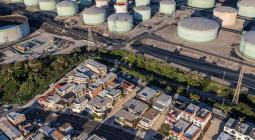“China already feels puzzled and skeptical of the Inflation Reduction Act,” said Li Shuo, a climate specialist at the Asia Society Policy Institute. “Throw in Trump and you deepen Chinese skepticism. This is political boom and bust. When it comes to selling clean energy to third country markets, China isn’t sweating at all.”
But even Trump’s agenda is not expected to completely stall clean energy’s momentum. Renewables are now economically attractive and are set to still grow, albeit more bumpily. Solar, which has plummeted by 90% in cost over the past decade, was added to the American grid at three times the rate of gas capacity last year, for example.
“We will see a big effort to boost the supply of fossil fuels from the US but most drilling is at full blast anyway,” said Ely Sandler, a climate finance expert at Harvard University’s Belfer Center.
“That’s quite different from demand, which is how power is generated and usually comes down to the cheapest source of energy which is increasingly renewables. If Donald Trump eases permitting regulations, it could even lead to more clean energy coming online.”
At the UN Cop29 talks in Azerbaijan, which started on Monday, countries are again having to grapple with a bewildering swing in the US’s commitment to confront the climate crisis. The outgoing Biden administration, which is trying to talk up ongoing American action at the talks, hopes its climate policies have enough juice to outlast a Trumpian assault.
“What we will see is whether we’ve achieved escape velocity or not and how quickly the booster packs are about to fall off,” said Ali Zaidi, Biden’s top climate adviser, at the Cop summit.




